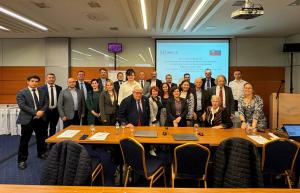
Preventing accidental water pollution remains a key challenge for many countries within and beyond the UNECE region. Approximately 60% of the world’s freshwater flows occur in transboundary river basins where 40% of the world’s population live. Countries rely increasingly on transboundary water resources to meet their growing demands. Accidental pollution can adversely affect water resources, aquatic ecosystems incl. fish populations, and supplies for drinking, households and agriculture.
The effects of the vast majority of transboundary accidents are transmitted through water bodies. Even small amounts of hazardous substances released into waters can cause significant environmental damage with far-reaching effects. The data of more than 1,000 tailings management facilities (TMFs) collected under the auspices of the Industrial Accidents Convention suggests that at least 25% of the TMFs may have transboundary effects. In river basins this percentage is significantly higher.
To exchange knowledge and practical examples on increasing capacities to prevent, prepare for and respond to accidental water pollution from TMFs, more than 150 international experts from over 40 countries across Europe, Africa and Central Asia, including from international and river basin organizations, gathered online and in person on 23-24 April at a UNECE workshop in Bratislava. The workshop included a half-day site visit to the reclaimed TMF in Žiar nad Hronom on 24 April.
The workshop was inaugurated by Vladimír Novák, General Director of the Water Section of the Ministry of the Environment of Slovakia, who stressed the importance of international cooperation in the professional technical and safety supervision of TMFs. He highlighted how tailings often represent a long-term impact, posing risks to the environment and public health.
“There are examples in Central and Eastern Europe where tailings facilities failed and these failures have led to accidental water pollution, soil, and groundwater contamination. It is important to understand, that these failures might have a large transboundary impacts,” explained Mr. Novák.
He also welcomed the practical work of experts at UNECE and the UNECE Safety Guidelines and Good Practices for Tailings Management Facilities, which supports policymakers and the business sector in improving awareness and sharing experiences and good practices.
Georgios Georgiadis, Secretary to the UNECE Industrial Accidents Convention, highlighted the importance and timeliness of the workshop's theme in view of the projected increase of the number of TMFs as part of the energy transition. He also stressed the importance of the long-standing and successful cooperation of water and industrial safety experts through the JEG to prevent accidental transboundary water pollution from tailings facilities.
During the workshop, experts from many countries, including Armenia, Romania, Slovakia, Tajikistan and Ukraine, shared practical examples on the safe operation of TMFs and of cooperation on the prevention, preparedness and response to accidental water pollution from TMFs. International experts, including from the International Commission on the Protection of the Danube River (ICPDR) and the Interstate Commission for Water Coordination in Central Asia (ICWC) showcased the importance of transboundary basin and regional organizations for coordinating tailings governance between the riparians as well as for integrating the issue of water pollution into river basin management process as well as its prevention and mitigation.
UNECE presented the Safety Guidelines and Good Practices for TMFs, a related TMF Checklist Methodology, the Online Toolkit and Training on strengthening mine tailings safety, which are available for use by all UN member states. Key discussion topics and challenges at the workshop were the identification and involvement of all relevant stakeholders in national and transboundary tailings governance, the preparedness of state organizations, owners and operators of TMF to prevent accidental water pollution, natural and technological and other risks, such as from military actions posed to TMFs as well as availability of data and measures to mitigate them, and the financing and use of TMFs after their operational closure.
Additionally, a half-day meeting of the JEG will be held on 24 April for JEG members and invited participants from UNECE region to discuss the results of the workshop, review ongoing JEG work and discuss future activities of the Group. The Federal Ministry for the Environment, Nature Conservation, Nuclear Safety and Consumer Protection of Germany provided financial support for the organization of the JEG meeting.
The workshop was organized by Ministry of the Environment of Slovakia, in cooperation with the state enterprise Vodohospodárska výstavba š.p. (the Slovak water management construction company) together with the UNECE Conventions on the Protection and Use of Transboundary Watercourses and International Lakes (Water Convention) and on the Transboundary Effects of Industrial Accidents (Industrial Accidents Convention) as well as and the Conventions’ Joint Expert Group on Water and Industrial Accidents (JEG).
More information can be found at: https://unece.org/info/events/event/381922 and https://unece.org/info/Environmental-Policy/Industrial-Accidents/events/390062

